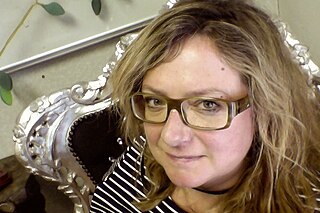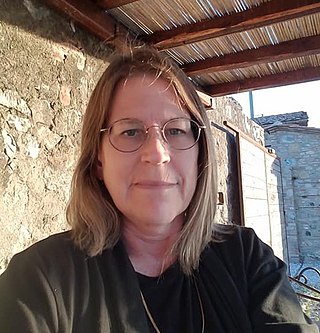Related Research Articles
In developmental psychology and developmental biology, a critical period is a maturational stage in the lifespan of an organism during which the nervous system is especially sensitive to certain environmental stimuli. If, for some reason, the organism does not receive the appropriate stimulus during this "critical period" to learn a given skill or trait, it may be difficult, ultimately less successful, or even impossible, to develop certain associated functions later in life. Functions that are indispensable to an organism's survival, such as vision, are particularly likely to develop during critical periods. "Critical period" also relates to the ability to acquire one's first language. Researchers found that people who passed the "critical period" would not acquire their first language fluently.
Neuroplasticity, also known as neural plasticity or brain plasticity, is the ability of neural networks in the brain to change through growth and reorganization. It is when the brain is rewired to function in some way that differs from how it previously functioned. These changes range from individual neuron pathways making new connections, to systematic adjustments like cortical remapping or neural oscillation. Other forms of neuroplasticity include homologous area adaptation, cross modal reassignment, map expansion, and compensatory masquerade. Examples of neuroplasticity include circuit and network changes that result from learning a new ability, information acquisition, environmental influences, pregnancy, caloric intake, practice/training, and psychological stress.
Mriganka Sur is an Indian neuroscientist. He is the Newton Professor of Neuroscience and Director of the Simons Center for the Social Brain at the Massachusetts Institute of Technology. He is also a Visiting Faculty Member in the Department of Computer Science and Engineering at the Indian Institute of Technology Madras and N.R. Narayana Murthy Distinguished Chair in Computational Brain Research at the Centre for Computational Brain Research, IIT Madras. He was on the Life Sciences jury for the Infosys Prize in 2010 and has been serving as Jury Chair from 2018.
Michael Matthias Merzenich is an American neuroscientist and professor emeritus at the University of California, San Francisco. He took the sensory cortex maps developed by his predecessors and refined them using dense micro-electrode mapping techniques. Using this, he definitively showed there to be multiple somatotopic maps of the body in the postcentral sulcus, and multiple tonotopic maps of the acoustic inputs in the superior temporal plane.

Cross modal plasticity is the adaptive reorganization of neurons to integrate the function of two or more sensory systems. Cross modal plasticity is a type of neuroplasticity and often occurs after sensory deprivation due to disease or brain damage. The reorganization of the neural network is greatest following long-term sensory deprivation, such as congenital blindness or pre-lingual deafness. In these instances, cross modal plasticity can strengthen other sensory systems to compensate for the lack of vision or hearing. This strengthening is due to new connections that are formed to brain cortices that no longer receive sensory input.
April A. Benasich is an American neuroscientist. She is the Elizabeth H. Solomon Professor of Developmental Cognitive Neuroscience, director of the Infancy Studies Laboratory at the Center for Molecular and Behavioral Neuroscience, and director of the Carter Center for Neurocognitive Research and Professor of Neuroscience at Rutgers University. She is also a principal investigator within the National Science Foundation-funded Temporal Dynamics of Learning Center headquartered at the University of California, San Diego’s Institute for Neural Computation.
Barbara Shinn-Cunningham is an American bioengineer and neuroscientist. She is the founding Director of the Carnegie Mellon University Neuroscience Institute, the George A. and Helen Dunham Cowan Professor of Auditory Neuroscience, and Professor of Psychology, Electrical and Computer Engineering, and Biomedical Engineering.

Sophie Kerttu Scott is a British neuroscientist and Wellcome Trust Senior Fellow at University College London (UCL). Her research investigates the cognitive neuroscience of voices, speech and laughter particularly speech perception, speech production, vocal emotions and human communication. She also serves as director of UCL's Institute of Cognitive Neuroscience.
Language deprivation in deaf and hard-of-hearing children is a delay in language development that occurs when sufficient exposure to language, spoken or signed, is not provided in the first few years of a deaf or hard of hearing child's life, often called the critical or sensitive period. Early intervention, parental involvement, and other resources all work to prevent language deprivation. Children who experience limited access to language—spoken or signed—may not develop the necessary skills to successfully assimilate into the academic learning environment. There are various educational approaches for teaching deaf and hard of hearing individuals. Decisions about language instruction is dependent upon a number of factors including extent of hearing loss, availability of programs, and family dynamics.

Suzanne Carolyn Purdy is a New Zealand psychology academic specialising in auditory processing and hearing loss. She is currently a full professor and head of the School of Psychology at the University of Auckland.
Sarah M. N. Woolley is a neuroscientist and Professor of Psychology at Columbia University's Zuckerman Institute. Her work centers on the neuroscience of communication, using songbirds to understand how the brain learns and understands vocal communication.
Sharon G. Kujawa is a clinical audiologist, Director of Audiology Research at the Massachusetts Eye and Ear Infirmary, Associate Professor of Otology and Laryngology at Harvard Medical School, and Adjunct Faculty of Harvard-MIT Health Sciences and Technology.and specialist in otolaryngology, Her specialty is the effects of noise exposure and aging on auditory function.
Anna Wang Roe is an American neuroscientist, the director of the Interdisciplinary Institute of Neuroscience and Technology (ZIINT), and full-time professor at the Zhejiang University, Hangzhou, China. She is known for her studies on the functional organization and connectivity of cerebral cortex and for bringing interdisciplinary approaches to address questions in systems neuroscience.

Tatyana Sharpee is an American neuroscientist. She is a Professor at the Salk Institute for Biological Studies, where she spearheads a research group at the Computational Neurobiology Laboratory, with the support from Edwin Hunter Chair in Neurobiology. She is also an Adjunct Professor at the Department of Physics at University of California, San Diego. She was elected a fellow of American Physical Society in 2019.
Sandra Gordon-Salant is an American audiologist. She is a professor at the University of Maryland, College Park, where she is also director of the doctoral program in clinical audiology. Gordon-Salant investigates the effects of aging and hearing loss on auditory processes, as well as signal enhancement devices for hearing-impaired listeners. She is the senior editor of the 2010 book, The Aging Auditory System. Gordon-Salant has served as editor of the Journal of Speech, Language, and Hearing Research.
Karen Denise Emmorey is a linguist and cognitive neuroscientist known for her research on the neuroscience of sign language and what sign languages reveal about the brain and human languages more generally. Emmorey holds the position of Distinguished Professor in the School of Speech, Language, and Hearing Sciences at San Diego State University, where she directs the Laboratory for Language and Cognitive Neuroscience and the Center for Clinical and Cognitive Neuroscience.
Hey-Kyoung Lee is a neuroscience professor at Johns Hopkins University. She studies cross-modal plasticity between visual and auditory systems.

Sarah L. Pallas is an American neuroscientist and a Professor of biology at the University of Massachusetts Amherst. She is a fellow of the American Association for the Advancement of Sciences (AAAS) known for her cross-modal plasticity work and map compression studies in the visual and auditory cortical pathways.
Susan Ellen Shore is an American audiologist who is the Merle Lawrence Collegiate Professor of Otolaryngology at the University of Michigan. She was elected Fellow of the American Association for the Advancement of Science in 2021.

Sophie Molholm is an American neuroscientist, who is the director of the Cognitive Neurophysiology Laboratory (CNL) and the Human Clinical Phenotyping Core (HCP) at the Albert Einstein College of Medicine in New York. She is professor (tenured) of Paediatrics, Neuroscience and Psychiatry, and Behavioral Sciences, and was endowed as the Muriel and Harold Block Faculty Scholar in Mental Illness at Einstein (2012–2017).
References
- 1 2 "Anu Sharma". Brain and Behavior Laboratory. 2015-07-30. Retrieved 2019-01-04.
- ↑ "Auditory Deprivation, Brain Changes Secondary to Hearing Loss, and More: An Interview with Anu Sharma, PhD". Hearing Review. Retrieved 2019-01-04.
- ↑ "Anu Sharma". Speech, Language, and Hearing Sciences. 2015-07-17. Retrieved 2019-01-04.
- ↑ "Anu Sharma - Google Scholar Citations". scholar.google.com. Retrieved 2019-01-04.